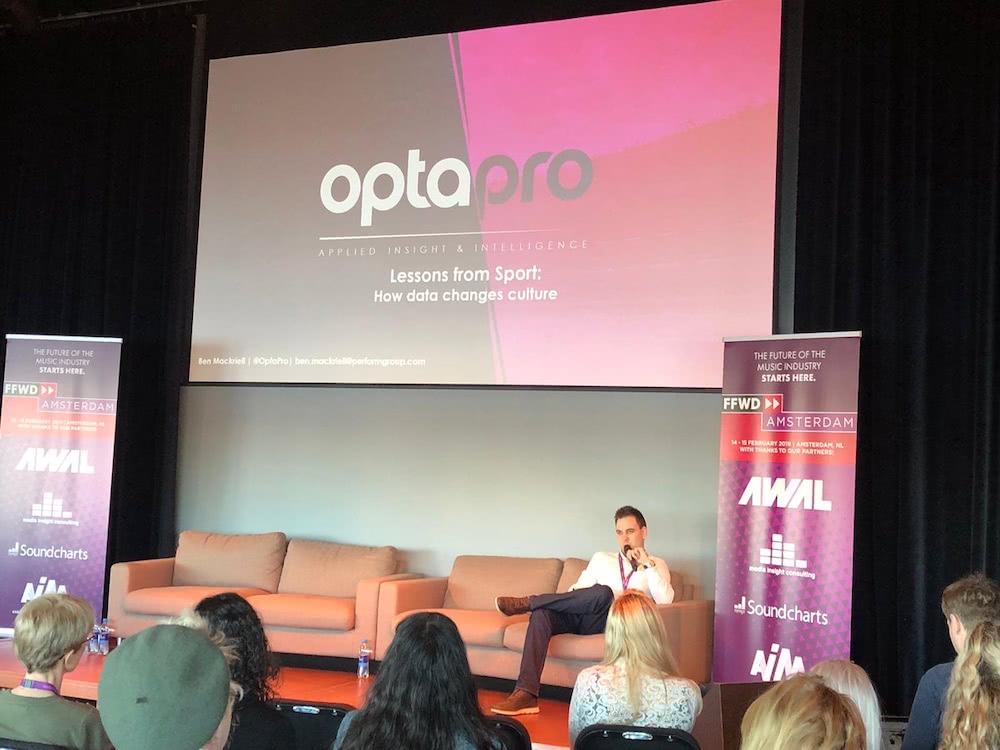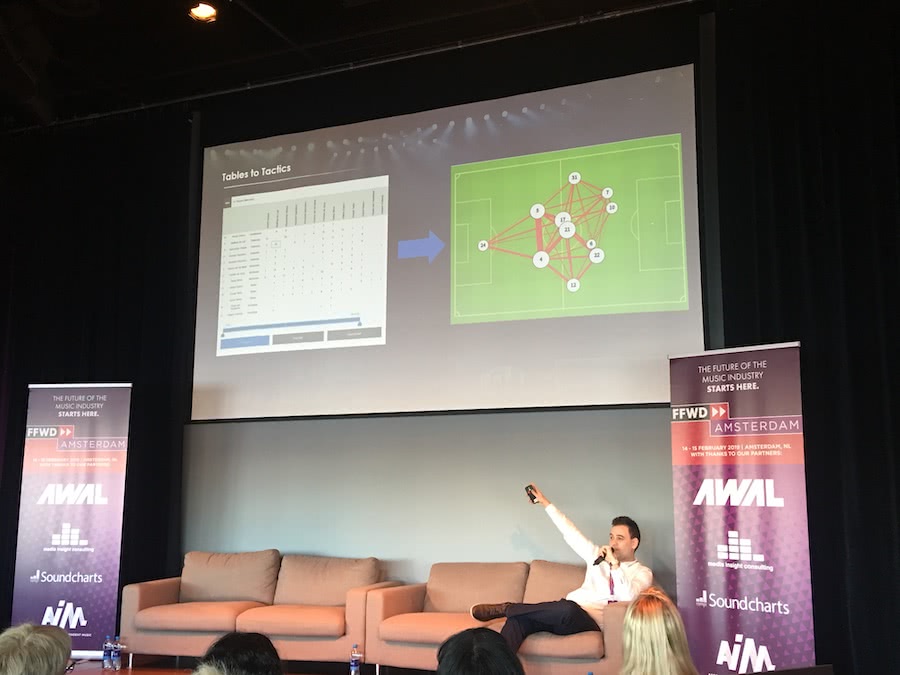What can music learn from the data-defined sports industry?

Using his 12 years in the sporting industry, Ben Mackriell, EVP Perform & Head of OptaPro, offered up lessons on how data can change culture at FastForward Amsterdam.
Using his years as a professional athlete (he was an international hockey player for Wales and a rugby player), and his Sport Science degree, Ben Mackriell is best known for setting up a European strategy for talent-sourcing using data and technology.

His methods are now used to measure and increase performance for rugby and football clubs, including the All Blacks, Premiership Rugby and Chelsea Football Club.
“For every match we have about 2,000 events. So things that happen in the game, and that is based on a huge database of what is now over 520,000 elite footballers across mens’ and women football,” Mackriell said onstage at contemporary music venue Muziekgebouw aan ‘t IJ in his Day 2 Keynote late last week.
“That is biographical data, who they are, age, how many games they’ve played – very basic stuff,” he continued. “And then on top of that we layer this performance data, the elite data, which is 2,000 events per game. We do that for 45 domestic competitions around the world; and we do it all live.”
Today sees Head of OptaPro @BenMackriell connect sport and music by delivering a guest talk at the @fastforward_xyz music industry conference in Amsterdam. Outstanding. pic.twitter.com/n2j6ZrVfzO
— OptaPro (@OptaPro) February 15, 2019
The analysts at OptaPro work in real-time from six offices around the world where a live stream of the game is beamed in and three people handle live data collection and analysis per game, as well as post-play data distribution packages.
“It’s all done live because it has to go to broadcasters, it has to go to betting companies, it has to go to the pro teams as the games are happening,” he said.
So, what can the music industry learn from sports? Mackriell said the days of ‘gut-feel’ influenced decisions are over. He noted anecdotal occurrences when decision-makers would pick and ditch players based on off-hand comments like, ‘my mate says he’s good enough’ and ‘his girlfriend’s a six at best so he much have zero confidence’ (no, really).
Now, Mackriell can measure ball control to support talent development and create efficiency scores for each player. He can also review the number of passes to a player or between players and tell coaches how and when to change tactic in real-time.
Interestingly – and this is where the music industry could take note both for artists and businesses – Mackriell profiles elite players who are potentially at the end of their careers and looks at their career pathways. Judging by their ability at the same age of the current, younger players he’s able to review whether these emerging players are on track to become an elite player.
“We’re also looking at AI heavily, and machine learning, at something called computer vision. This is to identify what is happening on a screen to collect data from it,” said Mackriell. “At the moment we need people, a lot of them, to collect all of that information live.”

Mackriell’s job does have a downside however: “It’s completely ruined my ability to enjoy a football match because I analyse everything,” he quipped.
As data and technology increasingly influences decision-making, it’s no pie-in-the-sky theorem that music could see its own literal players hired and fired based on performance statistics. Think moneyball for music. While data metrics and targets have always been at the forefront of employee promotions (and terminations) in the business sector, who’s to say bands won’t have a similar choice?
Thanks for the inspiring panels and lovely talks @fastforward_xyz ! #musicbusiness #ffwd19 #amsterdam pic.twitter.com/UwsY43KnFi
— Pieter De Sutter (@Pieterdesutter) February 15, 2019
The oft-quoted Moneyball book (and subsequent film, starring Brad Pitt as the central character Billy Beane), shares a real-life story about how data and metrics can be applied to talent spotting, and winning. Technology has moved on since Moneyball, but the theory still rings some truth: study the numbers, gain an advantage. Professional coaches today track their athletes’ performance with a myriad of apps; the same software may come in handy for bands when a new bass player is needed at the last minute.
However, whether data can tell a band if a new member, despite their onstage excellence, is ‘not an asshole’ when it comes to the close confines of a tour bus still remains to be seen.
FastForward returns to Sydney’s University of Technology Sydney (UTS) on 11-12 April, before its staging in London in September.
This article originally appeared on The Industry Observer, which is now part of The Music Network.


































